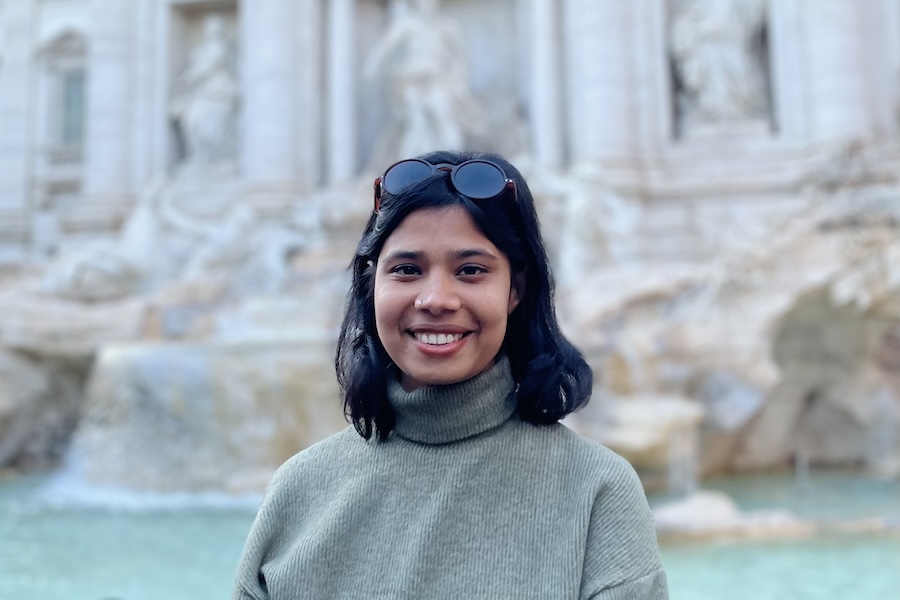Student Spotlight: Arya Adityan

Arya Adityan is a fourth-year doctoral student pursuing a degree in religion through Florida State University’s Department of Religion, part of the College of Arts and Sciences. In 2017, Adityan earned her bachelor’s degree in history, economics and political science from Mount Carmel College Autonomous in Bangalore, India. Two years later, she earned her master’s degree in society and culture from the Indian Institute of Technology Gandhinagar. She won a 2024 Research and Creativity Award from the FSU Graduate School, a distinction designed to recognize the superior scholarship of FSU graduate students. Adityan’s research focuses on Hinduism and the Indigenous religious practices of South India, and she is projected to graduate in Fall 2027.
Tell us a little about your background, where you’re from, and what brought you to FSU.
I grew up in a town in South India called Kollengode. After earning my bachelor’s and master’s degrees, I moved to the U.S. solely for the doctoral opportunities. I primarily chose FSU to work with my adviser Elizabeth Cecil, the Timothy Gannon associate professor of religion. Her work on Hindu religions in early South and Southeast Asia is fascinating and diverse. I also chose FSU for its amazing and supportive Department of Religion, which encourages interdisciplinary research, making it the perfect place for my academic journey.
What inspired you to pursue a doctorate in religion?
My interest in religion wasn't sparked by a singular moment but rather a lifelong fascination with stories. Growing up, I was surrounded by folktales, epics, and performances featuring gods, goddesses, ancestral spirits, animals, among others. During my master's program, I discovered how they’re profound tools for people to understand, navigate, and shape the world around them. Religious studies, with its interdisciplinary approach, became the perfect avenue to explore how narratives and performances continue to both shape society and be shaped by society.
Can you break down your areas of research for us?
I focus on Hinduism and Indigenous religious practices in South India, particularly Bhuta Kola, a tradition of seasonal ritual performances in the Tulu region. In Tulu language, the word “Bhuta” typically means a spirit. Bhuta can take the form of animals, deified humans, and more-than-human figures, among others. During the Bhuta Kola celebrations, the Tulu people invoke and consult the ancestral spirits of the land and its animal inhabitants through oracular rituals. My research involves studying texts, Tulu oral narratives, and the physical nature of objects used in the festival to manifest the divine.
Tell us about your nine-month research fellowship at Leiden University in the Netherlands.
The fellowship, which ended in May, was incredibly fulfilling, and I must thank my adviser for introducing me to PURANA, a European Research Council-funded project at Leiden University. The project traces the composition, transmission, translation, and agency of the Sanskrit Purāṇas through a transregional and transhistorical process. Purānas are a type of sacred text, recording Hinduism’s history through stories about deities, pilgrimage, rituals and more. The texts also praise local sacred places and temples, so as a researcher interested in regional literature within the South Asian puranic genre, I was instantly intrigued. During the fellowship, I took part in Sanskrit reading groups, presented my research at conferences, organized roundtables, and conducted fieldwork in European museums to study the materiality and curation of Indigenous ritual objects.
What aspect of your areas of study do you find most rewarding?
Interacting with the communities I study allows me to witness practices firsthand and gain invaluable insights into lived experiences. This understanding goes beyond the texts on a page. I also enjoy interacting with the scholarly community; it’s a constant source of inspiration and growth. Finally, the freedom to explore seemingly unrelated topics fosters unexpected connections, and I find it fascinating to learn from diverse geographies.
What do you want the public to know about your research? Why are your topics important?
My research challenges the traditional Western definition of “religion,” which often focuses on written texts and private internal beliefs, overlooking many practices and perspectives outside this category. Examining oral narratives, empowered objects, landscapes, and the agency of non-human and more-than-human figures in the South Asian religious context allows for a more nuanced understanding of these diverse traditions.
What is something people may not know about studying religion?
The academic study of religion is not only learning about texts and their interpretations; it approaches the world's religions from a historical and social-scientific perspective, viewing them as an outside investigator rather than a practitioner. While personal beliefs may inform our work, the emphasis and outcomes are primarily critical. Religious studies integrate methodologies from various disciplines such as history, philosophy, anthropology, sociology, and other allied fields to understand the nature and function of religions. It also contrasts with theology, which seeks to shape and interpret religious traditions.
What on-campus resources have helped you achieve success?
I am grateful for the FSU Libraries’ supportiveness towards researchers. Additionally, the many graduate conferences, seminars, and scholarly talks have been instrumental in keeping me motivated. However, beyond academic support, what I cherish most about FSU is its serene environment; taking evening walks on campus is my favorite ritual and helps me relax.
Are there any faculty or staff who have helped or inspired you?
I’m lucky to have such a supportive adviser who guides me through challenges. Whenever I feel overwhelmed, she helps me find my direction and understand my strengths.
Additionally, I was new to the discipline when I first arrived at FSU. Associate professor of religion Joseph Hellweg's class “Theory and Methods in the study of Religion” provided a solid foundation that still benefits me today.
Even though you might miss FSU, what are you looking forward to once you graduate?
My passion lies in research, and I will aim for postdoctoral positions or research-focused faculty roles. I’m also drawn to the prospect of curatorial opportunities in a museum setting.
